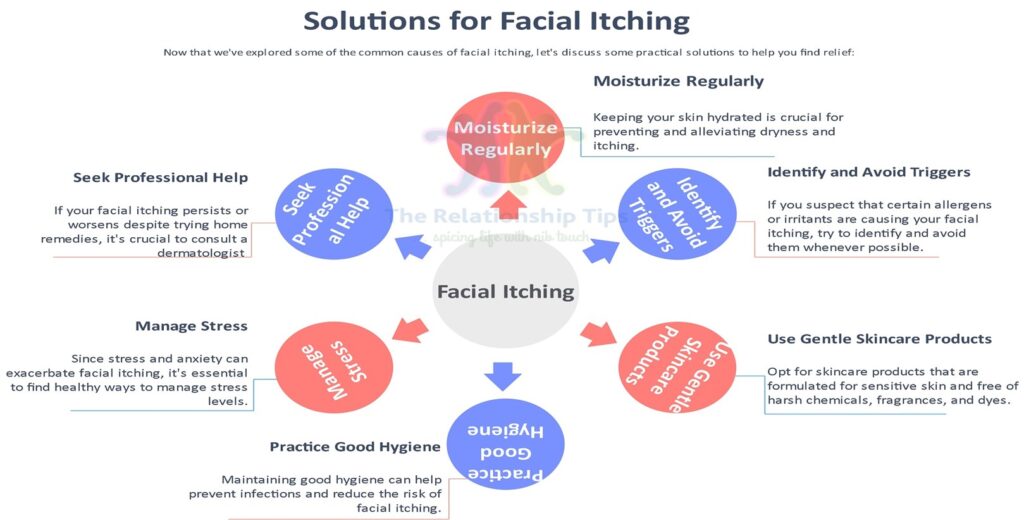Have you ever experienced the maddening sensation of an itch on your face that just won’t go away? Facial itching can be more than just a nuisance; it can disrupt your daily life and leave you searching for answers. From dry skin to allergies, stress, and even infections, the causes of facial itching are diverse and often elusive.
But fear not! In this comprehensive guide, we’ll delve into the myriad reasons why your face might be itching and explore practical solutions to help you find relief. So, if you’re tired of scratching your head (or face) in frustration, read on to discover the secrets to soothing that persistent itch and restoring comfort to your skin.
In This Article
- 1 Understanding Facial Itching
- 2 Infographic: Solutions for Facial Itching
- 3 Solutions for Facial Itching
- 4 Frequently Asked Questions About Facial Itching
- 5 What are the most common causes of facial itching?
- 6 How can I relieve facial itching at home?
- 7 When should I see a doctor about my facial itching?
- 8 Can facial itching be a sign of a more serious medical condition?
- 9 Are there lifestyle changes I can make to prevent facial itching?
Understanding Facial Itching
Facial itching can be caused by a wide range of factors, including skin conditions, allergies, irritants, and even psychological triggers. It’s essential to pinpoint the underlying cause to determine the most effective course of action. Here are some common reasons why your face might be itching:
-
Dry Skin
One of the most common culprits of facial itching is dry skin. When the skin lacks proper moisture, it can become dry, flaky, and prone to itching. Factors such as cold weather, harsh soaps, and excessive washing can exacerbate dryness and lead to itching. To combat this, it’s essential to moisturize regularly and use gentle, hydrating skincare products.
-
Allergies
Allergies can manifest in various ways, including facial itching. Common allergens such as pollen, pet dander, and certain foods can trigger allergic reactions that cause itching, redness, and swelling. If you suspect that allergies are the cause of your facial itching, consider keeping a journal to track your symptoms and identify potential triggers. Antihistamines and avoiding allergens can help alleviate itching associated with allergies.
-
Skin Conditions
Several skin conditions can cause facial itching, including eczema, psoriasis, and rosacea. These conditions are characterized by inflammation, redness, and itching, which can be exacerbated by environmental factors and certain triggers. Treatment for these conditions often involves topical creams, medications, and lifestyle changes to manage symptoms effectively.
-
Irritants
Exposure to irritants such as harsh chemicals, fragrances, and pollutants can irritate the skin and cause itching. Common irritants found in skincare products, makeup, and household cleaners can trigger allergic reactions or exacerbate existing skin conditions. Opting for fragrance-free, hypoallergenic products and minimizing exposure to irritants can help reduce facial itching.
-
Stress and Anxiety
Believe it or not, stress and anxiety can also contribute to facial itching. When we’re stressed or anxious, our bodies release hormones that can affect the skin’s barrier function and trigger inflammatory responses. This can manifest as itching, redness, and other skin issues. Practicing stress-reducing techniques such as mindfulness, meditation, and deep breathing exercises can help alleviate itching associated with stress.
-
Infections
In some cases, facial itching may be a symptom of an underlying infection, such as fungal infections or bacterial folliculitis. These infections can occur when the skin’s natural defenses are compromised, allowing pathogens to multiply and cause irritation. Treatment typically involves topical or oral medications prescribed by a healthcare professional.
-
Sun Exposure
Excessive sun exposure can damage the skin and lead to itching, redness, and sunburn. Prolonged exposure to UV rays can cause inflammation and trigger allergic reactions in some individuals. To protect your skin from sun damage and reduce itching, it’s essential to wear sunscreen daily, seek shade when outdoors, and wear protective clothing.
Infographic: Solutions for Facial Itching

Solutions for Facial Itching
Now that we’ve explored some of the common causes of facial itching, let’s discuss some practical solutions to help you find relief:
-
Moisturize Regularly
Keeping your skin hydrated is crucial for preventing and alleviating dryness and itching. Choose a gentle, fragrance-free moisturizer and apply it to your face daily, especially after washing or showering.
-
Identify and Avoid Triggers
If you suspect that certain allergens or irritants are causing your facial itching, try to identify and avoid them whenever possible. This may involve making changes to your skincare routine, diet, or environment.
-
Use Gentle Skincare Products
Opt for skincare products that are formulated for sensitive skin and free of harsh chemicals, fragrances, and dyes. Look for products labeled as hypoallergenic and non-comedogenic to minimize the risk of irritation.
-
Practice Good Hygiene

Maintaining good hygiene can help prevent infections and reduce the risk of facial itching. Wash your face regularly with a gentle cleanser, avoid touching your face with dirty hands, and wash your pillowcases and towels regularly to remove bacteria and allergens.
-
Manage Stress
Since stress and anxiety can exacerbate facial itching, it’s essential to find healthy ways to manage stress levels. Incorporate stress-reducing activities such as exercise, meditation, yoga, or spending time outdoors into your daily routine.
-
Seek Professional Help
If your facial itching persists or worsens despite trying home remedies, it’s crucial to consult a dermatologist or healthcare professional. They can help identify the underlying cause of your itching and recommend appropriate treatment options.
Frequently Asked Questions About Facial Itching
What are the most common causes of facial itching?
Facial itching can stem from various factors, including dry skin, allergies, skin conditions like eczema or psoriasis, exposure to irritants, stress, infections, and even sun exposure. Identifying the underlying cause is crucial for effective treatment.
How can I relieve facial itching at home?
There are several home remedies you can try to alleviate facial itching. Moisturizing regularly, avoiding harsh skincare products, identifying and avoiding allergens and irritants, practicing stress-reducing techniques, and maintaining good hygiene are all effective strategies. Additionally, over-the-counter antihistamines or topical creams may provide temporary relief for itching associated with allergies or skin conditions.
When should I see a doctor about my facial itching?
If your facial itching is persistent, severe, or accompanied by other concerning symptoms such as swelling, redness, or oozing sores, it’s essential to consult a dermatologist or healthcare professional. They can help diagnose the underlying cause of your itching and recommend appropriate treatment options, which may include prescription medications or further testing.
Can facial itching be a sign of a more serious medical condition?
In some cases, facial itching may be a symptom of an underlying medical condition that requires prompt attention. Conditions such as autoimmune diseases, hormonal imbalances, or neurological disorders can manifest as itching or other skin symptoms. If you have concerns about the underlying cause of your facial itching, it’s crucial to seek medical evaluation to rule out any serious underlying conditions.
Are there lifestyle changes I can make to prevent facial itching?
Yes, several lifestyle changes can help prevent or reduce facial itching. These include protecting your skin from sun damage by wearing sunscreen and protective clothing, maintaining a healthy skincare routine with gentle products, managing stress levels through relaxation techniques or therapy, and avoiding known allergens and irritants. Additionally, staying hydrated, eating a balanced diet rich in antioxidants, and getting enough sleep can support overall skin health and reduce the risk of itching.
Conclusion
Facial itching can be a frustrating and multifaceted issue, but armed with knowledge and practical solutions, you can effectively manage and alleviate your symptoms. By identifying potential triggers, such as dry skin, allergies, stress, or infections, and implementing targeted interventions like moisturizing regularly, avoiding irritants, and managing stress levels, you can regain control over your skin health.
Remember, finding relief from this may require patience and persistence, but with the right approach, you can restore comfort and confidence to your daily life. Whether it’s seeking professional help or making simple lifestyle changes, prioritize your skin’s well-being, and say goodbye to that incessant itch for good. Here’s to healthy, itch-free skin and a happier, more comfortable you!






Stumbling upon this website was such a delightful find. The layout is clean and inviting, making it a pleasure to explore the terrific content. I’m incredibly impressed by the level of effort and passion that clearly goes into maintaining such a valuable online space.
Thanks for sharing this exiting information